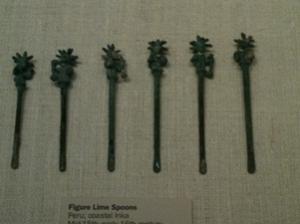
lime powder container (used traditionally in coca chewing), 1st-7th-century, Colombia (Quimbaya), Metropolitan Museum of Art, NY
Drawing a distinction between high-potency cocaine vs. natural coca leaves and the teas, candies and soaps made from it is fair. So is the claim of coca use being a tradition going back thousands of years -- visit any museum with an Andean collection and you'll likely see high-end, ancient spoons and containers used to dispense lime powder used by coca chewers to extract alkaloid from the raw leaves.
Whether the promise to "fight trafficking" is sincere depends on what one means by that. Bolivia will continue to carry out law enforcement operations to interdict illicit cocaine shipments, to find and destroy illicit coca fields, maybe even to break up criminal operations. In that sense Bolivian Pres. Evo Morales (an indigenous Bolivian and himself a coca grower) is as sincere as our leaders are here in the United States.
If the question, however, is whether such exercises are actually useful, decades of data say they are not. Coca growing has undergone large shifts over the decades between the three major producing countries -- Bolivia, Colombia and Peru -- but with the total from the three countries combined staying relatively constant. Drug warriors in the US and at the UN have touted a drop in recent years in the estimated number of hectares (10,000 square meters or 2.47 acres) being used to grow illicit coca for the cocaine trade. But all that means is the coca is more potent now -- less growing is needed to produce the same amount of cocaine.

lime spoons, coastal Inka, Peru, mid-15th to 16th century, Metropolitan Museum of Art
But for the many victims of drug trafficking -- the young and old massacred each week in Mexico, for example -- only the whole truth will one day free them. And the whole truth of drug policy is that prohibition causes violence, costs money and lives and doesn't work, all the politically cautious displays of cooperation notwithstanding.
This work by StoptheDrugWar.org is licensed under Creative Commons Attribution-ShareAlike 4.0 International
Add new comment